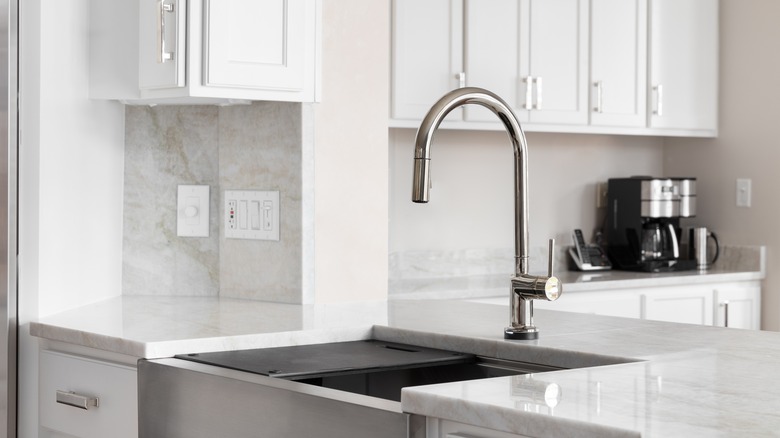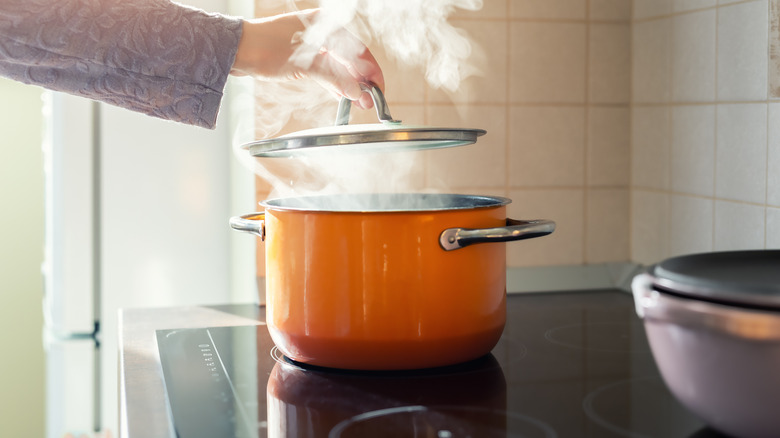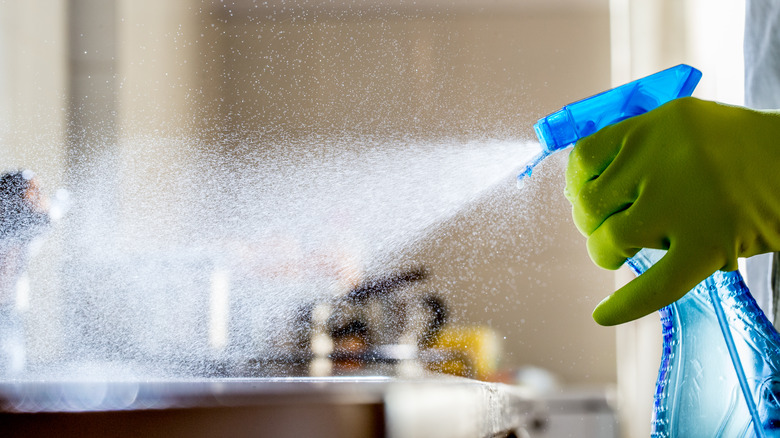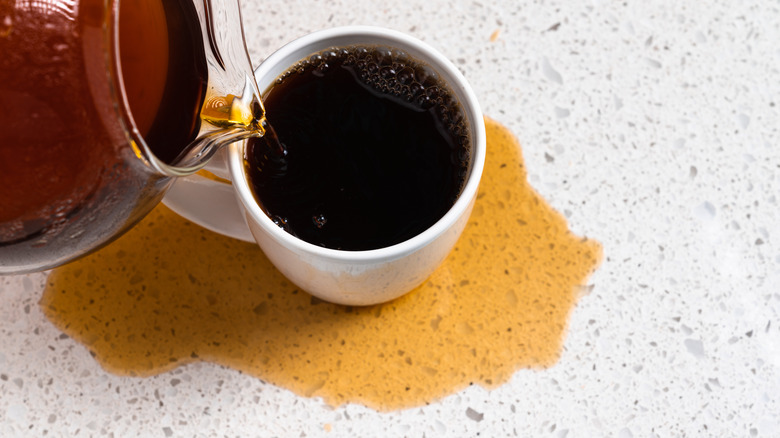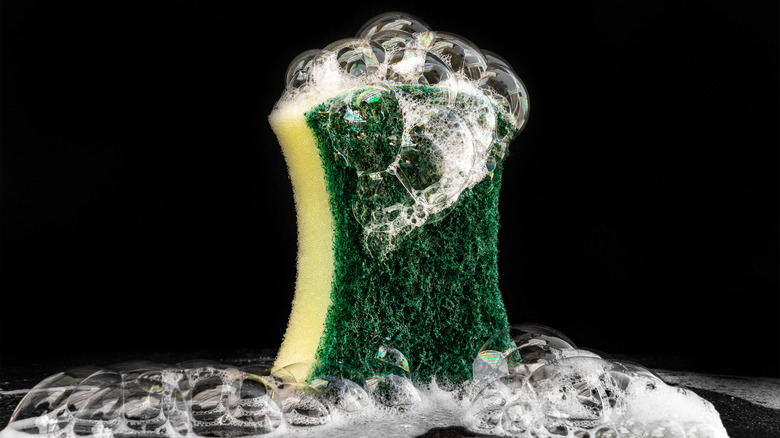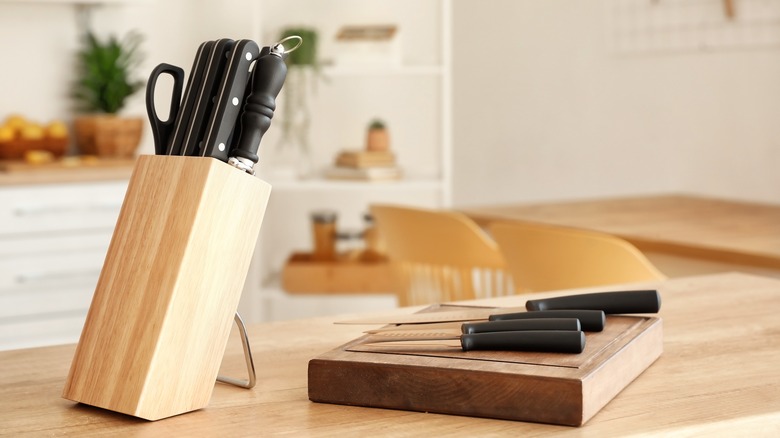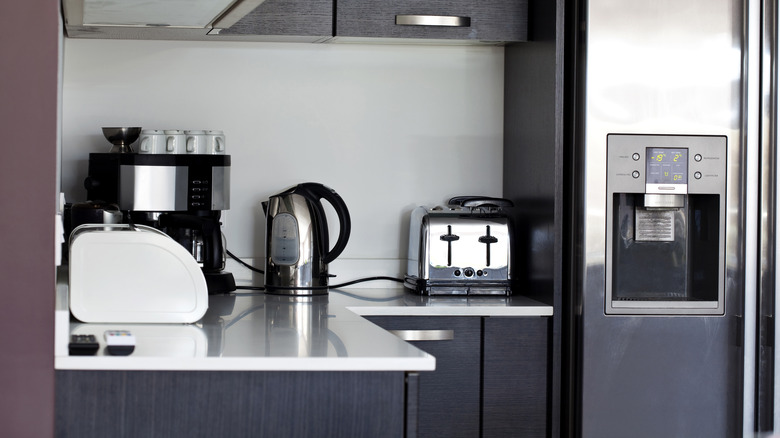6 Things You Should Never Do If You Have Quartz Countertops
While granite countertops remain a high-end countertop material, quartz is also having a moment among homeowners. Not only are quartz countertops considered a beautiful addition to any kitchen or other common areas, but they are also slightly more durable than granite. Part of this has to do with the way these countertops are made. According to Forbes, quartz countertops are also known as "engineered stone countertops" because they are 93% quartz combined with human-made chemicals. The result is a durable product that also comes in virtually any color you can think of.
Quartz countertops are coveted for their beauty and durability, and they don't require a lot of special maintenance outside of basic cleaning. Despite all these positive attributes though, it is still possible to damage these countertops. Many of these mistakes can occur during food prep and cooking processes, but can also involve accidents and poor cleaning habits. While quartz countertops can last several years and even increase the value of your home, it's important to avoid some of the most common mistakes that can damage these luxury items.
Never places hot pots and pans directly on quartz
Part of the appeal of quartz countertops are their durability, which includes chip-resistance. In theory, these countertops can last for many years without getting chipped or sustaining surface scratches. However, one caveat to this benefit is the possibility of heat damage. This can occur by placing hot pots or pans directly on a quartz countertop. Heat can damage quartz due to the fact that it is not 100% stone, as the countertops are engineered with other materials like fillers, such as silicon. If you do place a hot item on your countertops, the actual stone may survive, but its aesthetic appeal may be destroyed with dark stains. According to Marble Concepts, quartz can only take up to 150 degrees Fahrenheit before this type of damage can develop.
To protect your quartz countertops from heat, never place hot pots and pans directly on top of them. The same applies to hot utensils or cooking tools. If you are not able to place these hot items on a stovetop, use trivets underneath hot items on top of your counters as a last resort. Also, if you have quartz in your bathrooms, make sure you don't place hot items on these spaces either. Examples include flat-irons, hair dryers, and other heated styling tools.
Don't spend money on unnecessary cleaning products
Regular maintenance is an important consideration before installing quartz countertops. Unlike other countertops that sometimes need maintenance with specialized cleaning products, quartz doesn't require the use of commercial cleaning products. On top of this, quartz countertops don't require commercial waxing or sealing products.
Instead of spending money on unnecessary cleaning products, you really just need mild soap and water to clean quartz countertops. For daily maintenance, simply wet a soft sponge or cloth with warm soapy water and wipe it across the surface. Another option is to use equal parts white vinegar and water, which you can also apply with a soft cloth for cleaning purposes. Unlike other types of stone countertops, vinegar will not damage quartz, and it can even help remove soap stains and streaks from daily cleanings. This method can also be used to clean oil and tougher spills from quartz countertops. Whether you use soap or vinegar, make sure these are wiped with water followed by a dry cloth for best results.
Don't neglect spills and stains on quartz countertops
While not as porous as granite, quartz may still get damaged if you leave spilt foods and liquids on your countertops for too long. This is especially the case with oils and acidic products such as coffee. Any stain can darken quartz, but as a rule of thumb, the more acidic the liquid, the higher the risk of potential irreversible damage to your countertops.
Your best course of action is to clean up all spills and mild stains as they occur. Waiting to clean these up until after a meal or for another day will only make them more difficult to remove, and possibly lead to permanent damage to your quartz countertops. If you're in a hurry, simply wipe up the spill with a soft cloth, but be sure to follow up with soap and water as soon as you can. More acidic stains may be removed with small amounts of vinegar or rubbing alcohol as spot treatments. Spills that are caught much later, or that have turned into hard stains might need assistance from a professional. Do not attempt to remove these on your own with sharp or abrasive objects, as these can damage the quartz even further.
Avoid abrasive sponges and cloths when cleaning quartz
It can be tempting to scrub a tough stain from your countertops with an abrasive sponge or cloth. However, doing so can cause more damage to your quartz countertop than the actual stain. While quartz is considered overall durable and scratch resistant, these qualities only go so far, and they don't always protect against harsh scrubbing. What's worse, both abrasive scrubbers and simply scrubbing the countertop too hard can lead to permanent damage to quartz.
Instead, always use mild soap and a soft cloth or sponge without scrubbing pads to clean quartz countertops. If you're dealing with a tough stain, take your time and use a soft sponge with gentle motions to help remove it. You may have to repeat the process several times before the stain lifts. Another option is to use diluted vinegar. However, you should not use cleaners intended for other surfaces, such as glass or oven cleaners, as these may also damage quartz and make them more prone to stains.
Don't use sharp utensils directly on your countertops
Quartz countertops are favored for their durability and overall scratch-resistance. However, despite this reputation, quartz can still endure surface scratches that can damage the underlying stone. One such mistake that can cause these types of scratches includes the use of sharp tools and utensils directly on top of your countertops. These include knives for cutting meat and vegetables, as well as laying down eating utensils without any protective barrier underneath them.
First, despite what you may have heard, stone countertops should never replace cutting boards for food preparation. Always cut foods on top of clean boards or plates to help protect your quartz countertop. Also, if you're dealing with stuck-on food on your countertop, resist the urge of using a knife or blade to remove it. Classic Quartz Stone recommends using a putty knife after you've wetted the surface instead, though you can also use some of the aforementioned cleaning techniques above.
Avoid dropping heavy objects on quartz countertops
While quartz is generally considered scratch and chip-resistant, it's still possible for countertops made out of this otherwise durable stone to crack under the weight of heavy objects. Aside from the weight of heavy objects, dropping items on top of your quartz countertop can also cause damage. This may include something as seemingly harmless as slamming a pot or a cutting board on the counter, particularly if you have a habit of doing this on a regular basis.
Your best bet to avoid accidental cracks and chips in your quartz countertop is to be as gentle as possible. Lay items down softly, including pots, plates, and utensils. You'll also want to take care when you're holding heavier objects around or above quart countertops. These include small appliances, such as coffee makers, convection ovens, air fryers, and more. Do not slide heavy objects across quartz countertops either, as you may create permanent scratches.
